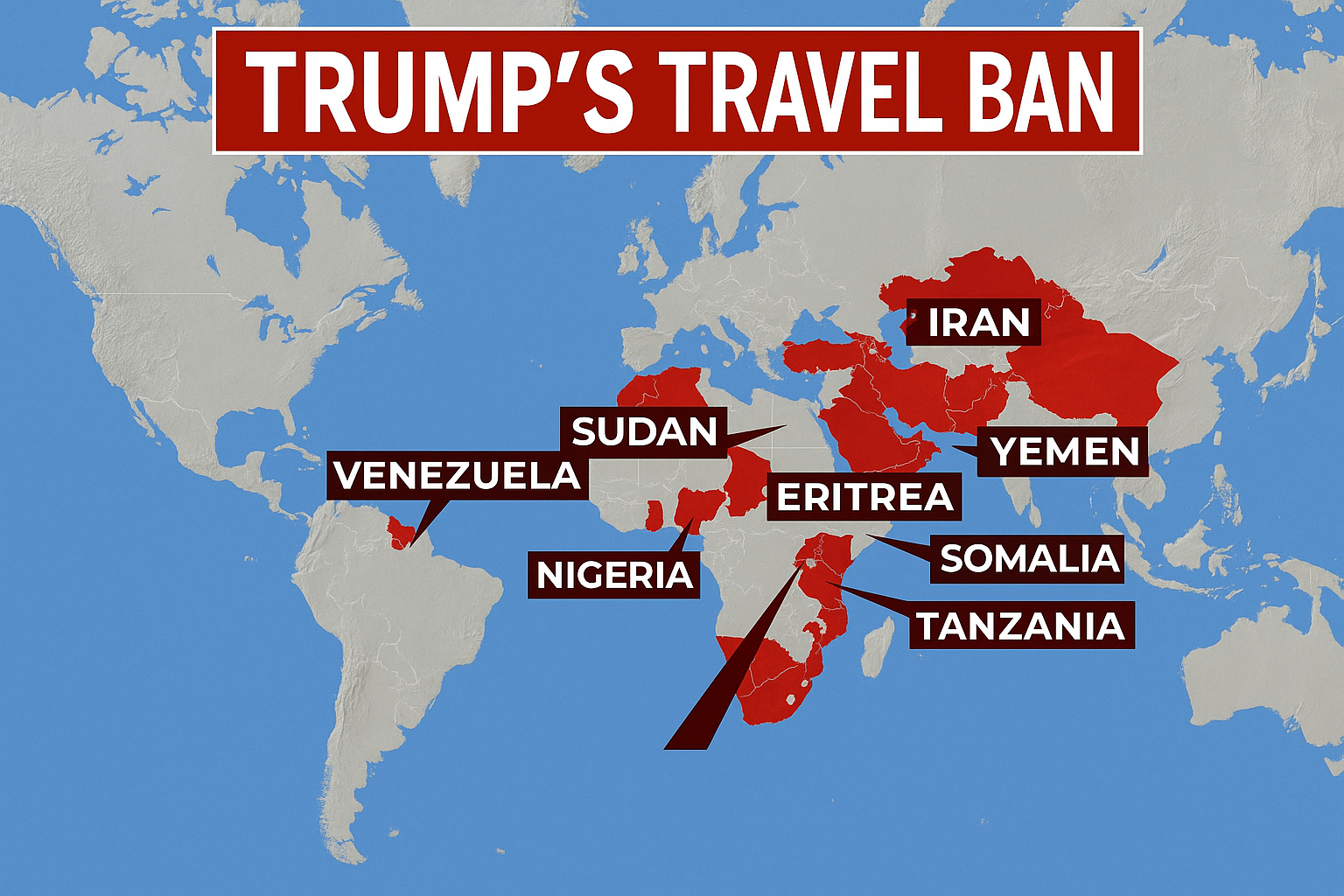
Overview: A Sweeping New Travel Ban
On June 4, 2025, the Trump administration announced a new proclamation banning travel from 19 countries in total. Twelve of these countries are subject to complete bans: Afghanistan, Congo, Equatorial Guinea, Eritrea, Haiti, Iran, Libya, Myanmar, Somalia, Sudan, and Yemen. The remaining seven countries are subject to partial bans: Burundi, Cuba, Laos, Sierra Leone, Togo, Turkmenistan, and Venezuela.
A Broader, More Aggressive Version of the Muslim Ban
This proclamation is an expansion of the “Muslim Ban” from the first Trump administration which banned travel from seven predominantly Muslim countries. It was issued following the recent firebombing attack in Boulder, Colorado, at an event advocating for the return of Israeli hostages. The administration has attempted to market this executive action as protecting United States citizens from an external threat, but we see this for what it is: a racist, hostile action that will cause harm not only for foreign travelers and immigrants, but for our entire community.
“It is no longer apt to call it a Muslim Ban… it is more expansive and more destructive.”
When the first Muslim Ban was enacted in 2017, it sowed confusion, chaos, and trauma for countless persons and families. This ban is more expansive and more destructive. It is no longer apt to call it a Muslim Ban, as many of the countries targeted—such as Haiti and Equatorial Guinea—do not have majority Muslim populations. While the proclamation is going to face legal challenges, and Benach Pitney Reilly Immigration (BPR) will do everything in its power to fight against this on behalf of our clients, it is first important that we provide a clear and detailed picture of exactly what this means and what some of the repercussions will be. The ban is subject to go into effect after midnight on Monday, June 9th, 2025.
What the Ban Actually Says
Most plainly, this proclamation issues a complete ban on foreign nationals entering the United States from the 12 countries mentioned above: Afghanistan, Congo, Equatorial Guinea, Eritrea, Haiti, Iran, Libya, Myanmar, Somalia, Sudan, and Yemen. For these countries, both nonimmigrant visas and immigrant visas will no longer be issued beginning June 9th, effectively making it so that no foreign national from those countries will be permitted to enter the United States in any capacity.
Then there are partial bans on foreign nationals from 7 other countries: Burundi, Cuba, Laos, Sierra Leone, Togo, Turkmenistan, and Venezuela. This restriction applies for both immigrant and nonimmigrant visas, the same as for the full ban. The distinction between a full and partial ban lies in the fact that the countries subject to only the partial ban will still be able to issue a limited number of nonimmigrant visas.
Are There Any Exceptions?
There are various exceptions to the proclamation—and they are the same for both sets of countries. Lawful permanent residents of the U.S. and those who held a valid visa that was granted before the proclamation took effect are not subject to the ban. Further, dual nationals from a banned country may travel to the U.S. if they have a passport from a country that is not on either of these lists. This proclamation does not revoke any visas, and it does not apply to any individual who has been granted asylum from any of these countries. Notably, Special Immigrant Visas from Afghanistan are an exception to this ban, as are visas for athletes coming to participate in the World Cup or the Olympics.
It is important to note that this ban does not have any effect on Egypt, the country of origin of the attacker in Boulder that the administration has used to justify this proclamation. The administration has promised to conduct a “review of the practices and procedures of Egypt to confirm the adequacy of its current screening and vetting capabilities” and BPR will monitor those developments and share information as it comes.
The Real-World Impact: Confusion, Fear, and Family Separation
This ban does not improve national security. It does not make our communities safer, and it does not serve the interests of Americans or immigrants. This order is born out of the same playbook that guides the administration’s immigration policy as a whole. This playbook is centered around fear, confusion, division, and hurt, and is a playbook BPR has come to know well.
“This ban does not improve national security. It does not make our communities safer.”
When the first Muslim Bans were enacted in 2017, BPR Immigration attorneys were showing up at airports and working to deliver success for their clients and for those that needed it. The same will continue to be true. Following Monday, immigrant visas will not be issued for nationals of the 19 countries outlined in total. But that does not mean BPR will not continue to fight for our clients from these countries, nor does it mean that we will not work to find avenues and paths towards success for our clients.
How BPR Is Responding
This is a scary time and we do not want to dismiss or downplay our clients’ fear. We at BPR Immigration are confident in our ability to take on the draconian actions of this administration but know it will still prove to be an immense challenge.
What Should Affected Individuals Do Now?
It is our hope that this blog post provides a clear and detailed look at the ban, its exceptions, and its overall implications. As with much of immigration policy in this administration, the landscape is constantly changing and BPR Immigration is committed to continuing to track and update information as those changes are made available. If you have any specific inquires or questions regarding the ban or the information in the post, we encourage you to contact us.
Don’t navigate this alone. Call 202-644-8600 or send us a confidential message to speak with an attorney about how this ban may affect you—we’re here and ready to help.
